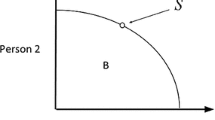Abstract
In this work we continue the work initiated in [1], in which a logic of individual and collective acceptance was introduced. Our aim in this paper is to investigate the extension of the logic of acceptance by public announcements of formulas. The function of public announcements is to diminish the space of possible worlds accepted by agents and sets of agents while functioning as members of a given group, team, organization, institution, etc., x. If a set of agents C ends up with an empty set of worlds that they accept while functioning as members of x, then the agents in C do not identify themselves any longer with x. In such a situation the agents in C should have the possibility to join x again. To that aim we discuss at the end of the paper an operation which consists of an agent (or set of agents) joining a given group, team, organization, institution, etc.
Preview
Unable to display preview. Download preview PDF.
Similar content being viewed by others
References
Gaudou, B., Longin, D., Lorini, E., Tummolini, L.: Anchoring institutions in agents’ attitudes: Towards a logical framework for autonomous multi-agent systems. In: Padgham, L., Parkes, D.C. (eds.) Proceedings of AAMAS 2008, pp. 728–735. IFAAMAS (2008)
Fagin, R., Halpern, J., Moses, Y., Vardi, M.: Reasoning about Knowledge. The MIT Press, Cambridge (1995)
Lewis, D.K.: Convention: a philosophical study. Harvard University Press, Cambridge (1969)
Gilbert, M.: On Social Facts. Routledge, London (1989)
Tuomela, R.: The Philosophy of Sociality. Oxford University Press, Oxford (2007)
Hakli, P.: Group beliefs and the distinction between belief and acceptance. Cognitive Systems Research (7), 286–297 (2006)
Lorini, E., Longin, D.: A logical approach to institutional dynamics: from acceptances to norms via legislators. In: Brewka, G., Lang, J. (eds.) Proceedings of KR 2008. AAAI Press, Menlo Park (2008)
Gaudou, B., Herzig, A., Longin, D.: Grounding and the expression of belief. In: Proceedings of KR 2006, pp. 211–229. AAAI Press, Menlo Park (2006)
Gaudou, B., Herzig, A., Longin, D., Nickles, M.: A new semantics for the FIPA agent communication language based on social attitudes. In: Brewka, G., Coradeschi, S., Perini, A., Traverso, P. (eds.) Proceedings of ECAI 2006, pp. 245–249. IOS Press, Amsterdam (2006)
Blackburn, P., de Rijke, M., Venema, Y.: Modal Logic. Cambridge University Press, Cambridge (2001)
Fornara, N., Colombetti, M.: Operational specification of a commitment-based agent communication language. In: Castelfranchi, C., Johnson, W.L. (eds.) Proceedings of AAMAS 2002, Bologna, pp. 535–542. ACM Press, New York (2002)
Verdicchio, M., Colombetti, M.: A Logical Model of Social Commitment for Agent Communication. In: Proceedings of AAMAS 2003, pp. 528–535. ACM, New York (2003)
Singh, M.P.: Agent communication languages: Rethinking the principles. IEEE Computer 31(12), 40–47 (1998)
Plaza, J.: Logics of public communications. In: Emrich, M.L., Hadzikadic, M., Pfeifer, M.S., Ras, Z.W. (eds.) Proceedings of ISMIS 1989, pp. 201–216 (1989)
Kooi, B.: Expressivity and completeness for public update logic via reduction axioms. Journal of Applied Non-Classical Logics 17(2), 231–253 (2007)
Walton, D.N., Krabbe, E.C.: Commitment in Dialogue: Basic Concepts of Interpersonal Reasoning. State University of New-York Press (1995)
Gelati, J., Rotolo, A., Sartor, G., Governatori, G.: Normative autonomy and normative co-ordination: Declarative power, representation, and mandate. Artificial Intelligence and Law 12(1-2), 53–81 (2004)
Kooi, B., Van Benthem, J.: Reduction axioms for epistemic actions. In: Schmidt, R., Pratt-Hartmann, I., Reynolds, M., Wansing, H. (eds.) Proceedings AiML 2004, pp. 197–211. King’s College Publications (2004)
Pettit, P.: Deliberative democracy and the discursive dilemma. Philosophical Issues 11, 268–299 (2001)
van Benthem, J., Liu, F.: Dynamic logic of preference upgrade. Journal of Applied Non-Classical Logics 17(2), 157–182 (2007)
Pucella, R., Weissman, V.: Reasoning about dynamic policies. In: Walukiewicz, I. (ed.) FOSSACS 2004. LNCS, vol. 2987, pp. 453–467. Springer, Heidelberg (2004)
Aucher, G., Balbiani, P., Farias Del Cerro, L., Herzig, A.: Global and local graph modifiers. In: Methods for Modalities 5 (M4M-5). ENTCS. Elsevier, Amsterdam (2007)
Author information
Authors and Affiliations
Editor information
Editors and Affiliations
Rights and permissions
Copyright information
© 2009 Springer-Verlag Berlin Heidelberg
About this paper
Cite this paper
Herzig, A., de Lima, T., Lorini, E. (2009). On the Dynamics of Institutional Agreements. In: Meyer, JJ.C., Broersen, J. (eds) Knowledge Representation for Agents and Multi-Agent Systems. KRAMAS 2008. Lecture Notes in Computer Science(), vol 5605. Springer, Berlin, Heidelberg. https://doi.org/10.1007/978-3-642-05301-6_5
Download citation
DOI: https://doi.org/10.1007/978-3-642-05301-6_5
Publisher Name: Springer, Berlin, Heidelberg
Print ISBN: 978-3-642-05300-9
Online ISBN: 978-3-642-05301-6
eBook Packages: Computer ScienceComputer Science (R0)




